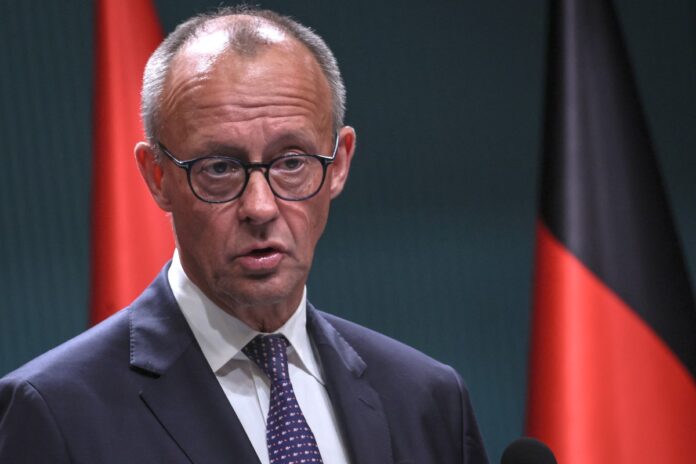A fresh political rift about the future of some Syrian nationals in Germany has opened up as the chancellor continues to take a tough stance on migration. We explain what’s going on.
Chancellor Friedrich Merz said on Monday that Syrian refugees in Germany must go home now that their country’s war is over, or face deportation.
Merz said there was “no longer any reason” for Syrians who fled their country’s brutal 13-year war to seek asylum in Germany.
The CDU leader said he was confident that a large proportion of refugees would return to Syria voluntarily and participate in the reconstruction effort there.
Syria “needs all its strength, and above all Syrians, to rebuild”, he said.
“We know that a large proportion of Syrians want to return. We will encourage this and we will also help the country to rebuild quickly.”
Merz then spelled out the possibility of deportations. He said: “Those who refuse to return to their country can, of course, be deported in the future.”
Why is the chancellor saying this?
The above comments should perhaps come as no surprise given the conservatives’ hard-line on migration.
The conservatives, under Merz, have been moving further to the right on migration issues in a bid to win back voters from the far-right Alternative for Germany (AfD).
READ ALSO: Merz calls far-right AfD ‘main opponent’ in next election
When it comes to Syrians in Germany, the topic has been bubbling in the political sphere for a while.
Shortly after the fall of Bashar al-Assad in December 2024, conservative politicians in Germany spoke out in favour of encouraging Syrian refugees to return to their homes.
According to German political show Panorama, around 4,000 Syrians have returned to their home country from Germany since then.
The renewed interest in Syria now follows Foreign Minister Johann Wadephul’s recent trip to Damascus.
Advertisement
During the visit, the CDU politician stressed that the potential for Syrians in Germany to return was “very limited” because the war had destroyed much of the country’s infrastructure.
“It’s really hard for people to live with dignity here,” the minister said during a visit to Harasta, a war-ravaged suburb of Damascus.
That statement sparked backlash within the Christian Democrats, with a number of top-level politicians making statements to the effect that they agree deportations can and should happen.
German Chancellor Friedrich Merz attends a joint press conference with Turkish President at the Presidential Complex in Ankara, on October 30, 2025. (Photo by Adem ALTAN / AFP)
Can the chancellor forcibly deport Syrians?
Absolutely not.
Around one million Syrians live in Germany, with most having fled the war during the European refugee crisis in 2015 and 2016.
Many Syrians have since gained a residence permit or German citizenship.
In 2024, Syrians were the largest group of naturalised citizens, accounting for 83,150 people in total. That represented 28 percent of the total number of naturalisations that year.
No matter how they initially came to the country, Syrian nationals with a residence permit, or those who have gained German citizenship cannot be forced to leave.
READ ALSO: What will happen to Germany’s one million Syrians after Assad’s fall?
It’s a bit trickier when it comes to Syrian nationals without a valid residence permit, for example those who are waiting to be granted asylum.
Whether they can remain in Germany in the long term depends on how the situation develops – in both Syria and Germany – and their individual cases.
Meanwhile, there is still a push to deport Syrians from Germany who have been convicted of a crime.
Merz said he had invited Syria’s new interim President Ahmed al-Sharaa, whose Islamist forces ousted long-time ruler al-Assad, to visit Germany to discuss the deportation of convicted Syrians from Germany.
READ ALSO: Germany to follow Austria and deport convicted Syrians
Advertisement
What’s the reaction?
Social Democrat interior policy expert Sebastian Fiedler says the forced deportation of Syrian refugees can only take place under certain conditions.
Syrians without residence permits, including criminals, are subject to the same laws as people from other countries who are required to leave the country, he told German news outlet Handelsblatt.
Each individual case has to be examined by authorities to determine whether a return to the origin country is safe, he said.
Fiedler pointed that many Syrians have been naturalised and are well integrated in Germany.
“Countless numbers work in jobs subject to social insurance contributions, some of which are systemically important, and thus make a contribution to our country,” he said.

A member of the Syrian community has painted a heart in the colours of Syria on her cheek as she attends a rally on December 8, 2024 in Berlin. (Photo by RALF HIRSCHBERGER / AFP)
Humans rights experts raised concerns about the calls for people to go back to Syria.
Kamal Sido, Middle East expert at the Society for Threatened Peoples, accused the German government of ignoring “the systematic human rights violations committed by Islamist rulers in Syria and courting a criminal solely for domestic political gain”.
He said the country had not become safer under al-Sharaa and said it’s “a disgrace” that Merz has invited the “war criminal” to Germany.
“Anyone who orders murders, abductions and the destruction of Alawite or Druze villages and towns must be arrested for war crimes and should not be received as a state guest in Berlin,” he said.
What about integration of refugees and asylum seekers into the labour market?
With the labour shortage intensifying in Germany, Merz was asked by reporters why in some cases asylum seekers who could potentially fill vacancies are deported.
Merz said that the government is working on solutions to stop this from happening.
Advertisement
“I am very unhappy that we still have people in the asylum process who we could actually integrate into the labour market or who are already partially integrated into the labour market,” he said.
“Our proposal is that we improve this administratively in future by completely separating the asylum and labour market integration procedures, and this is what the so-called Work and Stay Agency is for,” said Merz.
As The Local has reported, the Work and Stay Agency is a planned digital resource to help immigrants settle in Germany and provide information on issues such as visas, housing or language courses.
The aim is to accelerate, digitise and centralise processes for skilled workers.
With additional reporting from AFP
Disclaimer : This story is auto aggregated by a computer programme and has not been created or edited by DOWNTHENEWS. Publisher: thelocal.de






